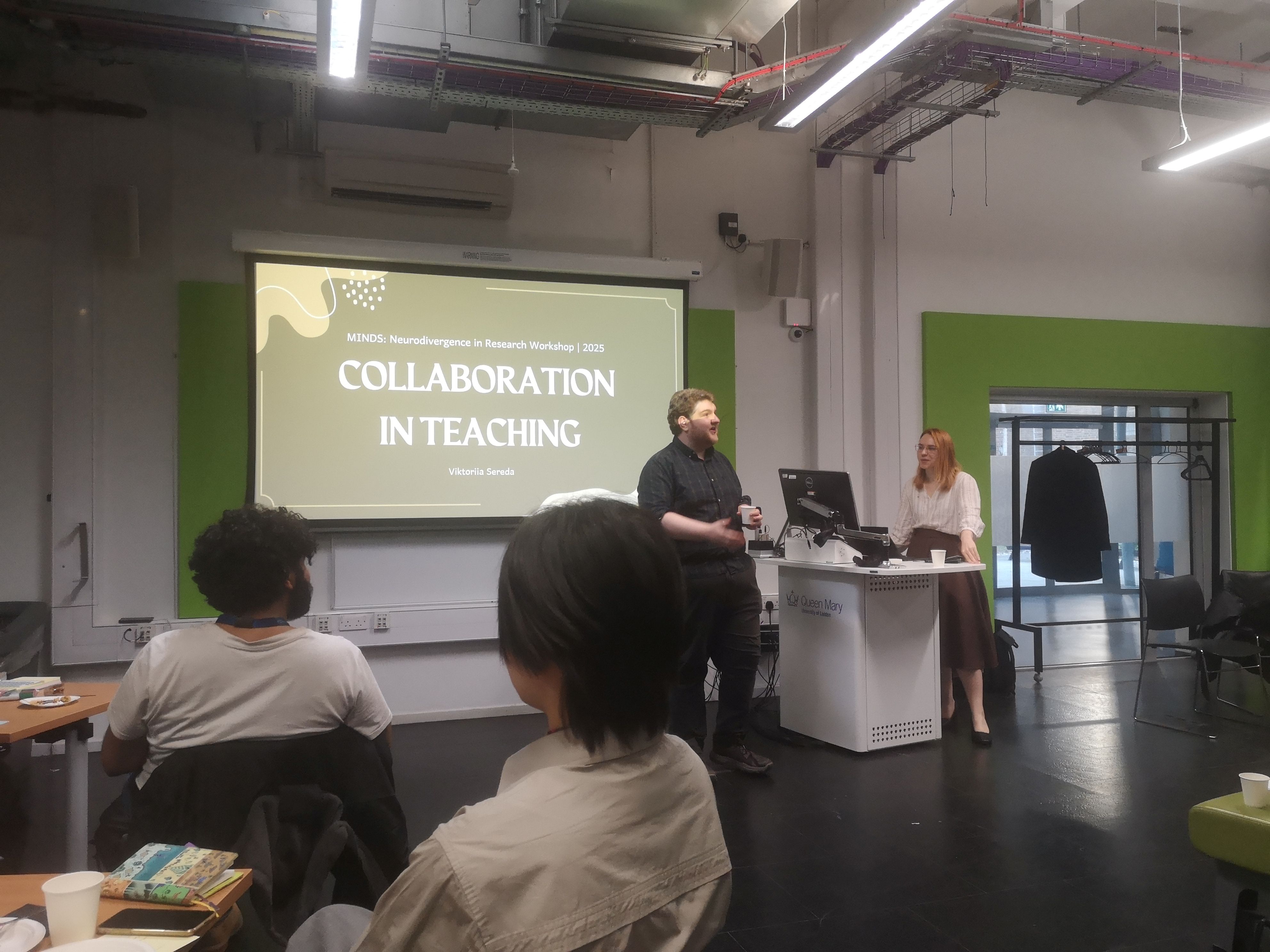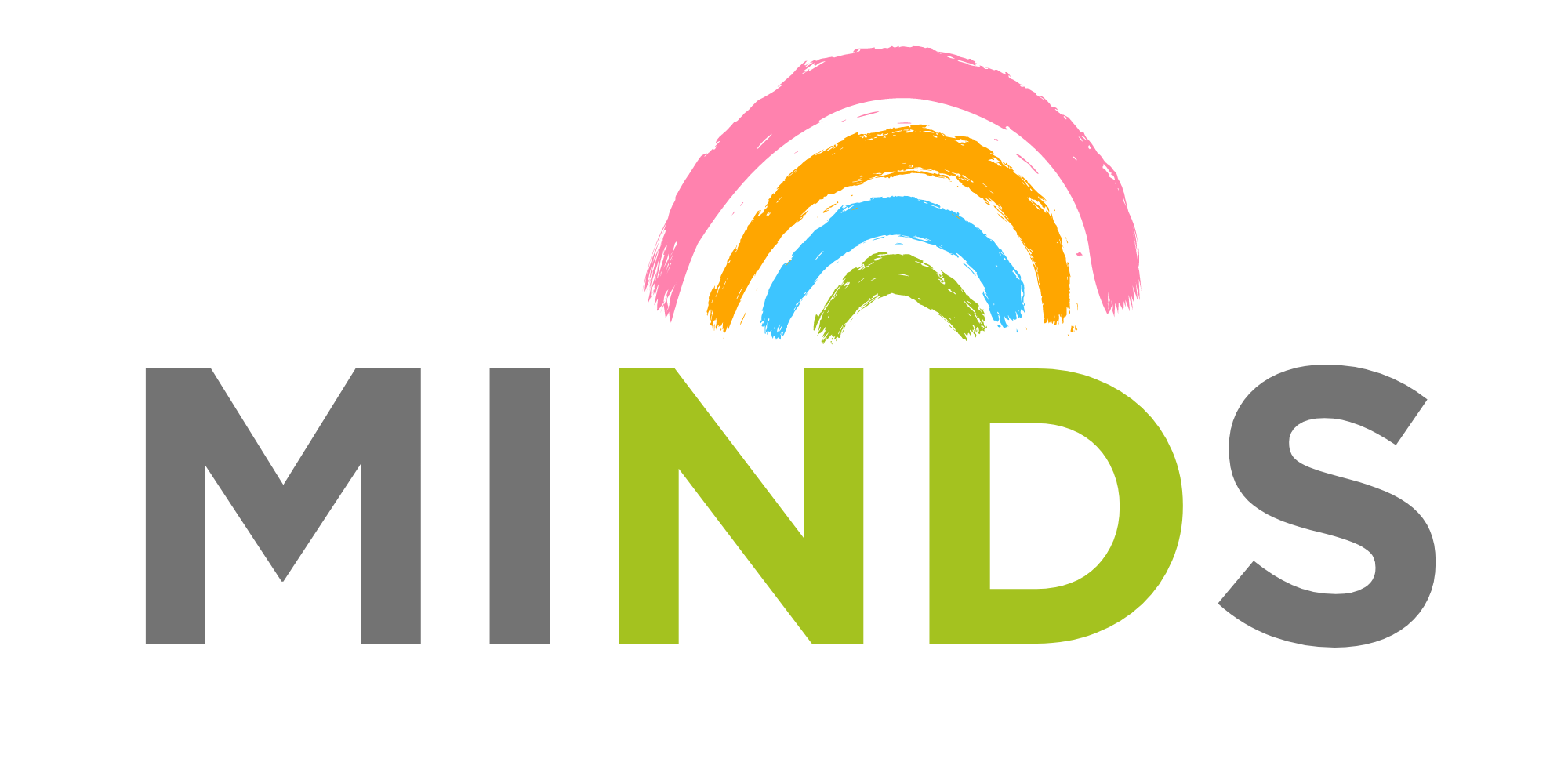On Thursday 3rd April 2025, the MINDS network held its inaugural workshop, in-person, at Queen Mary University of London. This report details the speakers, points of discussion, plus feedback provided by attendees to build on for the next session.
What is MINDS?
MINDS (Mutual Inclusion through Neurodiversity in Science) is a network for researchers, neurodivergent people, and neurodivergent researchers. Through MINDS, we want to promote inclusive practices through encouraging and supporting researchers to work with neurodivergent individuals, highlighting good practices, and providing a platform to empower neurodivergent people to have an input on research that directly impacts them. More details on our website at https://mindsintech.org.uk/

What are MINDS Workshops?
To build towards our goals, and alongside our blog post and mailing list, we wanted to create a space where research, neurodiverse lived experiences, and inclusive methodologies could be shared and discussed with a likeminded audience. Funding for two workshops was kindly provided by the Queen Mary University of London Enhancing Research & Innovation Cultures Fund, with this the first of the two.
Inclusive Environment
Creating a safe space for all was vital to encourage positive discussion amongst attendees. We designated two adjacent rooms to be quiet spaces: the “computer room” at the back, separated from the main space by a door and glass walls; and the foyer, while not being dedicated to attendees, provided easy access to the toilet, fresh air, and help from the porter. No attendees used the computer room, but one person used the foyer during the workshop.
We also acknowledged that some neurodivergent attendees might not be up for talking. To help them feel more comfortable, we provided green, yellow, and red stickers which represented “I’m happy to chat”, “I’d like to chat, but I might need more time”, and “I’d rather be on my own” respectively. About half of attendees took a sticker, with the vast majority (if not all) being green.
Speakers and Talks
We invited four speakers to give a talk at the workshop, with one 30-minute keynote talk given by Prof Nelya Koteyko, and three shorter 15-minute talks given by Emma Hayashibara, Viktoriia Sereda, and Avishai Passman. These talks were interspersed with time to discuss and ask questions.
Prof Nelya Koteyko
Nelya is a Professor of Language and Communication at Queen Mary University of London. Her research lies within the intersection of several disciplines including applied linguistics, visual studies, human-computer interaction, and social psychology.
Nelya’s talk was titled “Collaborating with autistic people to inform interdisciplinary research and software design”. During her talk, Nelya discussed how digital technology innovations are often designed to help autistic users meet typical social norms, overlooking their unique communication and sensory preferences. Nelya showed how participatory research — combining linguistics and human-computer interaction design — can challenge this deficit-based thinking. The talk drew on insights from the Autistic Adults Online project (https://autisticadultsonline.com), developed through long-term collaboration with autistic advisors, autism charities, and autistic researchers.
After Nelya’s talk, she introduced two interactive activities reflecting on her work with autistic adults on social media use. One featured interactive prototypes of social media tools developed following discussion with autistic adults: one of these, called The Small-Talkifier, was designed to “add the useless niceties to your social media posts, and make them more palatable to neurotypical sensitivities”. The second activity included cards describing a challenge that her study participants faced and their coping mechanisms. Workshop attendees were encouraged to read these cards and discuss their experiences and thoughts around social media use.

Below are some thoughts, points of discussion, and questions which were shared with the group:
- Increased usage of emojis at work is not very ‘inclusive’, emojis are open to interpretation.
- On Challenge 4 about Sensory Overload: “I agree with the sentiment that social media is overwhelming. There is too much content all the time and I find that it is difficult to disengage. Having ADHD made it difficult to control the compulsion to use the apps which meant I had to delete them entirely.”
- Does having more time to compose messages on social mead lead to increased scripting online for autistic individuals?
- Did you separate ideas/discussions around different platforms of social media?
- What are the challenges of doing this type of research in terms of timeframes, when academic research often takes years (funding, research producing outcomes), and social media changes so rapidly, not least with the role of AI?
- How does this research influence content creation in terms of accessibility?
- Is there a set guideline for privacy of data collection? Who sets it? Do people know about it?
- How do we safeguard ourselves from the influence of AI?
Emma Hayashibara
Emma is a multiply neurodivergent PhD student at Queen Mary University of London, researching mental health disparities among neurodivergent young people through an intersectional lens.
In her talk, Emma presented the background and information about her research. She highlighted how existing mental health assessment tools are designed with neurotypical individuals in mind, centring her work on the differences in experiences of mental health challenges for neurodivergent individuals, and whether applying these assessment tools to neurodivergent people may be measuring something unintended.
Emma also explained the need for research to focus beyond white and privileged individuals, highlighting that the intersectionality of race and neurodivergence may exacerbate mental health disparities. Emma detailed her work, using participatory methodologies to better understand the mental health challenges of neurodivergent individuals from diverse backgrounds, and working with them to develop a new tool for assessing mental health.
Emma concluded by sharing her experiences of being a multiply neurodivergent PhD student, how this impacts her work, and some strategies both for her, and for working with neurodivergent participants.
Viktoriia Sereda
Before moving onto further legal training, Viktoriia studied law at Queen Mary University of London from 2021 to 2024. While studying at Queen Mary, she founded and ran the Neurodivergent Society, creating a safe space for neurodivergent students, alongside advocating for their needs within the university environment.
During her talk, Viktoriia shared information about her and the Neurodivergent Society’s role in a joint project with Giorgia Pigato. This project enabled co-production between neurodivergent students and Queen Mary Academy in training about neurodivergence provided to teaching staff at the university.

Viktoriia highlighted the role of students in both designing and delivering the training, leaning on their lived experience to make the training more personal and meaningful. Viktoriia also reflected on her own experiences of neurodivergence and provided some useful tips for attendees on accessibility in teaching environments.
Viktoriia concluded by asking attendees to reflect on a time when they were accommodated.
Avishai Passman
Avishai works for the NHS, supporting co-production and advocating for young adult service users that have transitioned from CAMHS to Adult Services, benefitting from his own experiences of neurodivergence.
Avishai’s talk reflected on his experiences of working with neurodivergent people within the NHS. He particularly focused on how he works with both neurodivergent people, and professionals with and without knowledge of neurodivergent conditions. Particularly, he focuses on investigating the experiences of neurodivergent individuals going through the NHS’ mental health services. To do this, he takes advantage of participatory and co-production research methodologies, working with young adults to understand their experiences and to improve NHS services collaboratively.
Feedback Results
In total, 22 people attended the session, around two-thirds of those who registered, and firmly on target. Three attendees provided feedback to us anonymously through an online form provided at the end of the session.
Positive Aspects
An Accessible and Safe Space
“I loved how accommodating it was for each of us. It was very clear how much thought and effort went into tailoring the event for neurodiverse people.”
“[I enjoyed] The chance to talk about neurodivergence in a neurodivergent safe space; using stickers to say whether you wanted to talk or not.”
Session Structure
“The structure was great. I would usually feel exhausted after something so long and people heavy, but there were a lot of opportunities to have breaks.”
Interactivity
“I also liked the tone of the workshop with the activities and discussion encouragement. It made it very engaging throughout and I think really helped to make me feel more connected to what the presenters were talking about rather than just passively listening. I didn’t feel like I was overly pressured to take part but encouraged in a very positive way to engage and talk to both attendees and presenters. It really had a great and accessible community feeling.”
Refreshments
“[I] appreciate the food and coffee.”
Areas for Improvement
Captioning
“I mentioned it during the workshop, but captioning would be nice. There were times when talks were a bit difficult to fully follow without subtitles.”
Directions
“Just a small suggestion for prior to the event, it would be nice to have a bit clearer instructions and photos of the building, just to help with getting to the event for those of us less familiar with the campus.”
NB: This respondent later mentioned that the email with directions was in their spam folder.
Clearer Facilitation
“Some of the facilitation could have been a bit clearer, ensuring participants understood a bit better what they were planning on doing.”
Further Mixing
“It would have been nice to have more time to meet people at the other tables – maybe some big group activities would have been useful.”
Reduce Food Waste
“The food waste seems a shame. I wonder if there is a way to advertise to university students that there is free food after an event left. I’m sure at least some students would take up the offer.”
NB: Following the session, I also discussed with another attendee that in future workshops, attendees could be encouraged to bring their own container for which to take any leftovers.
Topics/Activities for Future Workshops
Intersectionality
“During the event our group really enjoyed talking about the interactional issues of neurodivergence. It would have been nice to have a themed event on that or an event series.”
“Intersection between neurodiversity and LGBTQIA+ identities (or a broader neurodivergence seminar series)”
Wider Experience Sharing
“I loved the atmosphere at the event, so I’d love an activity where we can discuss our experiences as researchers in a structured way but with a similar more relaxed atmosphere. It would be really nice to hear from a wide range of the other attendees about their own experiences to really foster that community feeling.”
Participant Recruitment
“I’ve also experienced myself and noticed from talking with a few other attendees that recruitment for testing with participants can be an intimidating step in the process for neurodivergent researchers, so I think it would be valuable if recruitment could be a topic of discussion.”
NHS Workers
“Maybe an NHS focused one. There were a couple of NHS workers present, and their experience was really interesting to hear. So maybe a full workshop from different types of workers.”
